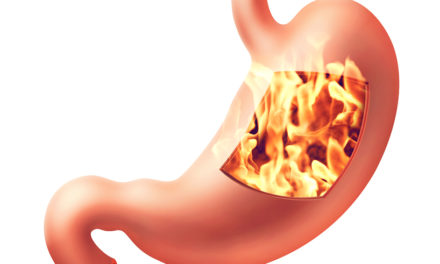In general, the medical profession focuses on increasing pH for people with digestive issues. If you do a literature search, you will find very little written about the stomach pH not being low enough (aka hypochlorhydra, or inadequate stomach acid). One old study, (Lancet 1978 Oct 21;2(8095):856-9) found susceptibility to cholera linked to hypochlorhydra.
It seems counterintuitive that taking hydrochloric acid could help someone with acid indigestion or GERD, but it can often give the individual relief. Dr. George Goodheart postulated that HCl was necessary for the pylorus to open, allowing the stomach contents to enter the duodenum. If the pylorus does not open, pressure builds up and some of the stomach contents enter the esophagus, creating GERD. So, oddly enough, taking HCl can give relief for acid reflux. Practitioners of natural health care have been taking this approach for years. Be careful, some patients experience a flare-up of symptoms when taking HCl—especially if they have been taking HCl suppressing medication. There is not much research supporting this idea, but some do exist. One article published in Ann Surg. (2001 Aug; 234(2): 147–148) discusses the issue of delayed gastric emptying in patients with GERD. The article does not suggest a mechanism.
Another study, appearing in J Gastroenterol. (2013 Feb;48(2):214-21. Epub 2012 Jul 25), linked hypochlorhydra with dyspepsia in female patients. The authors concluded, “Gastric hypochlorhydria in female dyspeptic patients may be involved in the exacerbation of dyspeptic symptoms.” There are also case studies, published in Integr Med (Encinitas. 2016 Oct; 15(5): 60–66) and Integr Med (Encinitas. 2016 Aug; 15(4): 49–53) that show therapies utilizing HCl having a positive effect on patients with GERD and other digestive issues.
There is also some research that shows the harm caused by suppressing HCl production. Research appearing in Eksp Klin Gastroenterol (2014;(12):30-6.) showed a relationship between SIBO and PPI (proton pump inhibitor) medication. Another study performed on mice by researchers from the University of Michigan Medical School at the Howard Hughes Medical Institute shows that acid-suppressing medications (PPIs, like Prilosec and Prevacid) may aggravate the conditions that they are designed to treat. Interfering with acid production by using omeprazole interferes with the body’s defense against bacteria, further causing irritation and inflammation of the mucosa.
While medicine does not embrace the concept of hypochlorhydra, natural health practitioners find that it is linked to allergies, asthma, hidden food sensitivities and arthritis. Many other problems also improve with digestive support, including fatigue, depression, anxiety, and chronic pain. You need HCl to be able to digest protein and to absorb minerals.
Nutrient deficiencies linked to hypochlorhydra: A person who is hypochlorhydric will have problems absorbing minerals. They will also have problems breaking down protein and absorbing individual amino acids. They tend to be deficient in vitamin B12, because an HCl and an enzyme known as intrinsic factor are necessary to absorb vitamin B12.
These deficiencies can be at the root of a variety of problems. A vitamin B12 deficiency will cause memory and cognition problems, depression, fatigue and problems focusing. If the deficiency is severe enough, it can mimic the symptoms of Alzheimer’s disease.
Being deficient in various amino acids can also cause problems. Tyrosine is needed to produce norepinephrine and tryptophan is needed to produce serotonin. This is a link between poor digestion and depression. Also, new research is linking leaky gut to problems with the blood-brain barrier, causing depression and even neurodegeneration.
Mineral deficiencies can cause a wide range of problems. There are studies that link osteoporosis to antacid use, possibly because acid suppression decreases the absorption of calcium and magnesium. Zinc is necessary to produce HCl. Hypochlorhydra decreases zinc absorption, which in turn decreases HCl production. That makes it important to check zinc levels on these patients. Poor HCl production may cause the body to scavenge protein and minerals from joints and may possibly be a contributing factor in osteoarthritis. Poor iron and copper absorption may contribute to anemia.
Blood chemistry: In hypochlorhydra, serum phosphorus will be below 3.0 and total protein will be normal to decreased (use physiologic values, not lab values). Serum globulin may be above 2.8. People with hypochlorhydra may be deficient in vitamin B12, this may be the connection between fatigue and depression found in patients with hypochlorhydra. If there is a B12 deficiency, the MCV will be above 90 and the MCH will be above 32. With low vitamin B12 the red blood cells tend to get a little large. To double check, do not test serum B12, test methylmalonic acid. Patients with thiamin deficiency will tend to have decreased CO2 and an increased anion gap (use physiologic normals, not lab normals). Chronic pancreatitis can lead to pancreatic insufficiency. You may see an increased serum amylase in these patients.
While the research supporting the concept of hypochlorhydra is spotty, many physicians working with the concept have gotten good results with their patients. Clearly, there needs to be more studies but addressing hypochlorhydra may be a way to help people with digestive and other health problems.






